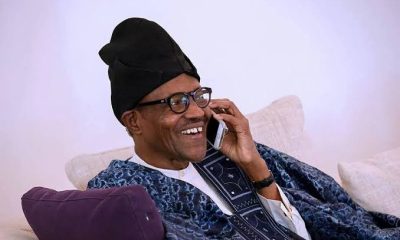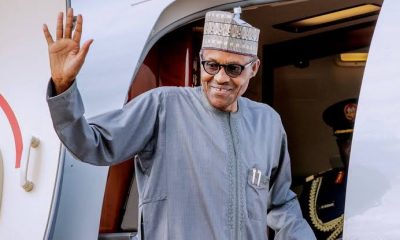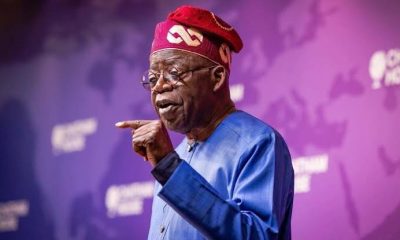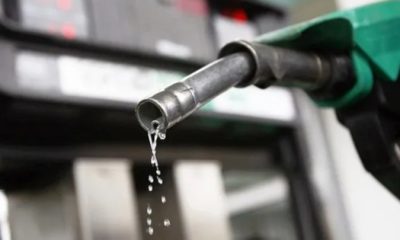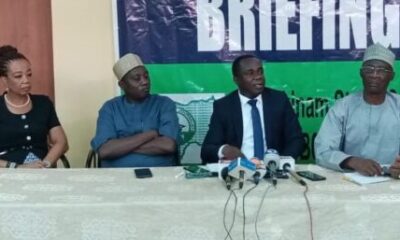National
How Buhari Spent N8trn On ‘non-existent’ Petrol Subsidies
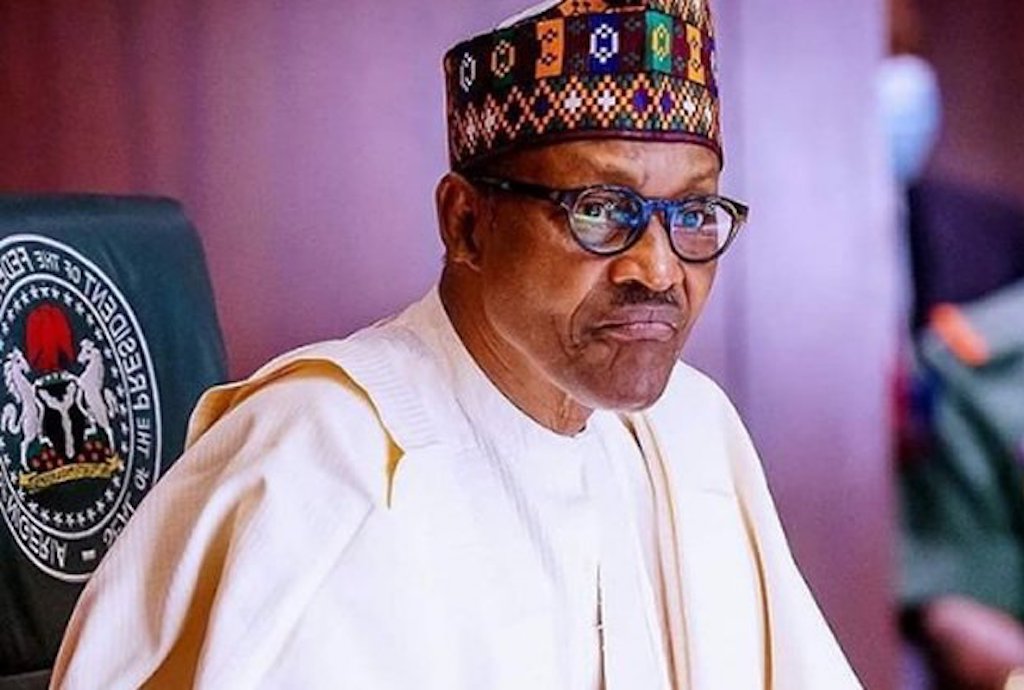
Before he won the 2015 presidential election, President Muhammadu Buhari led the opposition party, the All Progressive Congress (APC) in grand opposition to the removal of petrol subsidies.
President Buhari’s contention then was that there was no subsidy on petrol and that the government then under President Goodluck Jonathan was corrupt and was looking for ways to fraudulently enrich themselves at the expense of the Nigerian masses.
Eight years down the line and with just days before the end of his two terms in government, President Buhari is leaving the country with the highest amount spent on subsidizing petrol in Nigeria’s history.
According to oil and gas industry reports conducted by the Nigeria Extractive Industries Transparency Initiative (NEITI), the cost of petrol subsidy from 2015 to 2020 was N1.99 trillion.
Also reports by the Nigerian National Petroleum Corporation (NNPC) to the Federation Accounts Allocation Committee (FAAC), showed that petrol subsidy cost N1.57 trillion in 2021 alone and another N1.27 trillion from January to May 2022. The government has a budget of N3 trillion to cover petrol subsidy costs from June 2022 to June 2023.
An aggregation of the entire costs showed that under President Buhari the government would have spent N7.83 trillion on petrol subsidies.
Refineries remain moribund despite promises
In 2015, while Nigeria’s four refineries located in Port Harcourt, Warri and Kaduna operated below full capacity, they produced about six million litres of petrol daily for local consumption with President Buhari through the then Minister of State Petroleum Resources, Dr. Ibe Kachikwu assuring Nigerians that the refineries would return to full capacity by the end of that year. It never happened.
In 2017, the refineries were partially shut down for maintenance but two years later in 2019 with no headway, the refineries were completely grounded.
The President leaves in about three week’s time with the refineries still under rehabilitation and badly mismanaged. In 2021, helped by loans from the African Development Bank, NNPC announced that it would completely overhaul the Port Harcourt refinery at the cost of $1.5 billion. The refineries in Warri and Kaduna are also under-going similar process.
Expert speaks
Speaking to Saturday Vanguard, oil and gas governance expert, Mr. Henry Adigun said by his failure to resolve the petrol subsidy issues in eight years, President Buhari is leaving the situation worse than he met it.
Mr. Adigun said the politics and emotion around the issue have pushed the country into huge debt burden, adding President Buhari lacked an understanding of how big the issue was and how it could be tackled.
According to him, “The first thing is you cannot manage properly what you do not understand. Most times our politicians talk from emotion and lack of fact. At times they do not take professional advice and would let you know how long they have been in government.
“The man didn’t believe there was a subsidy and they all assumed it was corruption but when they came in and it stared them in the face then they learned and when they learned they now had to make harsh decisions. Buhari made one in 2016 when he raised (pump price) from N87 to N145 but he didn’t sustain. That point in time was the time to allow it to go once and for all but he capped it.
“By capping it and not providing enough foreign exchange for other importers, but allowed only NNPC to become the sole importer of the product in the country, they made the situation worse. That led to the problem they are having now.
“What they have done in the last eight years is to make it worse for the country, make it worse for the incoming administration. They have ballooned the cost and the volume. They failed because they never understood the problem and they made it political”.
He explained that NNPC became the sole importer of petrol due to economic reason, stressing that the difference the exchange rate approved for the NNPC compared to the other importers made impracticable for the others to import and remain profitable.
Adigun therefore urged the incoming administration to settle first settle down and understand the problem before taking a decision on the petrol subsidy challenge.
He noted that the government should eventually hands off any role in the downstream sector and allow the private sector run for the growth and economic development of the country.
The cash the private sector has can bail Nigeria out but the private sector will not invest in area where they cannot get good returns. Look around you in Abuja and Lagos, you will see everybody investing real estate or fintech; that is because it is where they can get good returns. It is not the business of the government to build or rehabilitate refineries”, he added.
He advocated phased removal of subsidy rather than having it in one swoop, stressing that in the past two years government has increased electricity tariff several times thereby eliminating the subsidy on power.
“Let’s have something like a three months phased removal, because it will become a political issue with labour unions opposed to it”, he stated, warning that the new government would struggle to fund its operations except it resorts to huge borrowing policy like Buhari has done.
TABLE – Petrol
Subsidy under Buhari
2015 ——————— N316.70 bn
2016———————- N99.00bn
2017 ——————— N141.63 bn
2018 ——————— N722.30 bn
2019 ——————— N578.07 bn
2020 ——————— N133.73bn
2021 —————— N1.573trn
Headline
Job Losses, Factory Closures Loom As Unsold Goods Pile Up — MAN
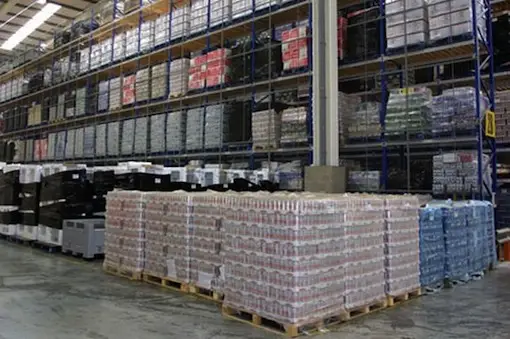
AGAINST the backdrop of sustained pressure in the foreign exchange market and high cost of production, the Manufacturers Association of Nigeria, MAN has indicated that inventory of unsold goods is escalating to levels now threatening the existence of companies operating in the production sector of the economy with attendant job losses.
Findings show that as of the weekend the foreign exchange market had recorded over 254 per cent plunge in the value of the naira since flotation of the currency by the Central Bank of Nigeria (CBN) in June 2023.
Recall that the naira traded for N471 per dollar in the official I&E market on June 13, 2023 before the floatation of the currency, but exchanged for N1,665.50 to a dollar as at February 23, 2024 on the Nigerian Foreign Exchange Market (NAFEM), indicating a depreciation of more than 253.6 per cent over the eight-month period. The forex crisis is also stoking inflation, and coupled with high energy costs, purchasing power has continued plummet, stifling demand for goods.
Speaking on the impact of this development on the manufacturing sector, Director General, MAN, Segun Ajayi-Kadir, said: “There are reports that across the board, many warehouses and plants of many manufacturing firms are stockpiled with unsold goods manufactured last year. “The development is as a result of the devastating effects of the exchange rate crisis, inflation, fake and sub-standard goods, smuggling and other macro-economics challenges.”
National
Relocation Of CBN: There’ll Be Consequences If Tinubu Doesn’t Reverse – Ndume
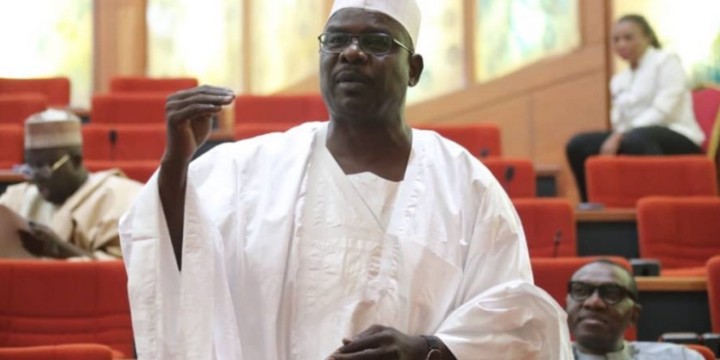
Ali Ndume represents Borno South Senatorial District and is Chief Whip in the 10th Senate
Ndume & Seun Okin
On the relocation of some agencies of the FG to Abuja and the apprehension of the Northern elite
Ndume: It’s not just about our Northern colleagues, this is a consensus because we only have one Federal Capital and that is Abuja. All these “Lagos boys_ that are thinking that Lagos is Nigeria are just misinforming or advising the President wrongly.
The Regulators of the financial institutions are supposed to be or are in Abuja. You want them to move because they say Lagos is the commercial capital. These are one of the mistakes and I am sure Mr President will reverse it because it doesn’t work. You can’t have two capitals or is the CBN Governor going to be operating from Lagos or the headquarters of the CBN is in Lagos?
Do you now say majority of our oil is extracted from the South South, you take NNPC to South South or is it because Nigeria’s agricultural base is more in the North, you take the Ministry of Agriculture to anywhere in the North. It doesn’t work that way and that is one of the problems that is cropping up but I am very sure and confident that Mr President will look at this because he is a Nationalist and not just a Lagos man. Some of these people, I repeat, some of these people think Lagos is Nigeria. Lagos is not Nigeria, Lagos is not the headquarters of Nigeria, the headquarters of Nigeria is in Abuja.
Seun Okin: …but the CBN is saying some departments are only moving to Lagos for operational purposes
Ndume: Which operational purposes? Why was the headquarters moved from Lagos to Abuja, is it not because of the same congestion?
Seun Okin: …only some units and departments are moving…
Ndume: If you are talking about proximity and space, why not you take them to Nasarawa, Kogi or Kaduna just nearby so that you can decongest the place and I even don’t see any issue of congestion, because there is just going to be cost because they will also be running from Lagos to Abuja everytime spending more money and even exposing the workers to unnecessary risks. This is a decision that is not well-thought out and I think the President will do something about it, I am confident of that. If that does not happen, of course this is democracy, we know what to do.
Seun Okin: ..and what will that be?
Ndume: That will be when the President refuses to reverse it
Seun Okin: What will be the reaction?
Ndume: The reaction right now is don’t try to bring in the case of tribalism into it. I am not a Hausa or Fulani man but I am a Northerner and I am a Nigerian first. And we say that since the headquarters of Nigeria was moved from Lagos because of congestion and inefficiency to Abuja where it is more Central and more of no man’s land because the Gwaris and Gbagyis are the only people there. We have enough space there, CBN can rent any office or even build from scratch to increase efficiency but moving some departments to Lagos is not the best of ideas at all or even moving any agency for that matter.
Seun Okin: Is there any political undertone or ulterior motive ..?
Ndume: I don’t want to believe there is, because I know the President that much, just that those political cartels that I told you, are in the corridors of power and trying to misinform the President.
The President will take action because he is a man that listens and corrects anything.
Some of them (political cartels) think they know better than everybody but they don’t know anything.
When you don’t know Nigeria, you only know Lagos then you start doing things as if Nigeria is Lagos.
Besides, they are not doing any favour to Mr President because this could have political consequences.
Seun Okin: Really?
Ndume: Yes, I am telling you this and those guys who are just sitting in their offices trying to hang onto Mr President will not be there to amend the political mistakes or even to correct it because they only know their offices and they only know that they have brains. It’s politics.. Was it not politics that brought them to that office in the first place? If Tinubu had not won the election as the President, will the CBN Governor be where he is today?
Who brought Mr President to that office? Was it votes from Lagos that brought him to that office? No way, Lagos is in Nigeria and we will not accept this wrong decision.

